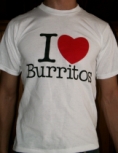The Burrito Blog
« Mike's Al Pastor Quesadilla Configuration | Fries In California Burritos »
Burritos Freed From Sandwich Shackles

Somewhere along the way, Earl #4 thought he could take credit for the wrap, the pita pocket, and the burrito. Rumor has it he tried to claim the crepe as well, but was rebuffed by French nationalists.
Well, the tyranny of Earl #4 has ended, citizens of the world.
From the gavel of an activist Massachusetts judge came the decision: a burrito is not a sandwich. This unelected official brazenly defied the wishes of the Earl and his followers, Panera Bread. Allow Boston.com to explain:
Panera, one of the country's biggest bakery cafes, argued that owners of the White City Shopping Center in Shrewsbury violated a 2001 lease agreement that restricted the mall from renting to another sandwich shop. When the center signed a lease this year with Qdoba, Panera balked, saying the Mexican chain's burritos violate its sandwich exclusivity clause.The judge cited Webster's Dictionary and testimony from a Cambridge chef in his decision. Will Hickox, Burrito Blog's go to guy for culinary commentary, was unavailable at the time of press.
Update: Jessie, Adjunct Burrito Analyst and law student, sent me the entire opinion in the case, because she rules. Yeah, she rules the library!
Introduction
*1 Plaintiff White City Shopping Center, LP ("White City") brought this declaratory judgment action against defendant PR Restaurants, LLC ("PR") seeking a declaration that it is not in breach of its commercial lease with PR. PR counterclaimed against White City for breach of contract, breach of implied covenant of good faith and fair dealing, and violation of G.L.c. 93A. PR now moves for a preliminary injunction, seeking to enjoin White City, its partners, employees or agents, from taking any action which would violate the exclusive use provision of its commercial lease with White City. Such actions include White City taking any action that would permit Chair 5 Restaurants, ("Chair 5"), the intervening party, from operating a Qdoba restaurant at the White City Shopping Center ("Shopping Center"). For the following reasons, the defendant's motion is DENIED.
Background
Defendant, PR, is a Massachusetts limited liability company that operates 22 Panera Bread ("Panera") restaurants in the New England area. Panera is a café-style restaurant chain that sells sandwiches, coffee, and soup. Mitchell J. Roberts is the manager of PR. PR is a tenant under a commercial lease for approximately 4,469 square feet of retail space in the Shopping Center located on Route 9, in Shrewsbury. White City, a limited partnership, is the landlord of the Shopping Center. Chair 5, the intervening party, is a Delaware limited liability company and franchisee of Qdoba, a Mexican-style restaurant chain that sells burritos, quesadillas, and tacos. Both Panera and Qdoba compete in the same "fast-casual" restaurant market. [FN1]
FN1. The fast-casual market offers high quality food within the convenience of a traditional fast food setting.
On March 14, 2001, White City entered into a ten-year lease ("the Lease") with PR for retail space to operate a Panera restaurant in the Shopping Center. Lease negotiations lasted several months partly because of PR's request to include an exclusivity clause in the Lease. PR authored the clause which underwent three revisions prior to the Lease's execution. The exclusivity clause that both parties initially agreed to restricted White City from entering into new leases with businesses that primarily sell sandwiches. In its first iteration, Section 4.07 of the Lease states, in relevant part:
Landlord agrees not to enter into a lease, occupancy agreement or license affecting space in the Shopping Center or consent to an amendment to an existing lease permitting use ... for a bakery or restaurant reasonably expected to have annual sales of sandwiches greater than ten percent (10%) of its total sales or primarily for the sale of high quality coffees or teas, such as, but not limited to, Starbucks, Tea-Luxe, Pete's Coffee and Tea, and Finagle a Bagle ... The foregoing shall not apply to (i) the use of the existing, vacant free-standing building in the Shopping Center for a Dunkin Donuts-type business, or for a business serving near-Eastern food and related products, (ii) restaurants primarily for sit-down table service, (iii) a Jewish delicatessen or (iv) a KFC restaurant operating in a new building following the demolition of the existing, freestanding building. No new building shall violate the no-build provision of this Lease.>br>*2 Lease § 4.07 (emphasis supplied).
The Lease contained no definition of "sandwiches" or "near-Eastern" food. [FN2] During lease negotiations, PR and White City did not discuss the definition of "sandwiches" or the type of food products they intended the term to cover. Furthermore, the parties never indicated, specified, or agreed that the term "sandwiches" included tacos, burritos, and quesadillas.
FN2. At oral argument, the parties compared near-Eastern food to Middle Eastern food, but did not provide any specific examples of either types of food.
Following the Lease's execution in March, the parties amended the exclusivity clause to include additional restrictions. On December 30, 2005, Section 4.07 of the Lease was amended, as follows:
The foregoing restriction shall also apply (without limitation) to a Dunkin Donuts location and to a Jewish-style delicatessen within the Shopping Center, but shall not apply to (i) use of the existing, freestanding building in the Shopping Center partially occupied by Strawberries and recently expanded for a business serving near-eastern food and related products, (ii) restaurants for primarily for sit down table service or (iii) a Papa Gino's restaurant (provided the same continues to operate with substantially the same categories of menu items as now apply to its stores and franchisees generally).
Lease § 4.07.
Sometime after the amendment, PR learned that White City had entered into discussions with Chair 5 to lease commercial space. Chair 5 planned to develop and construct a Qdoba restaurant in the same Shopping Center as Panera. After learning of the parties' plans, PR had its attorney contact White City to express concern and seek an assurance that White City would not enter into a lease with Chair 5. PR believed that White City's leasing of space to Chair 5 violated Section 4.07 of the Lease. Specifically, PR believed, and later asserted that tacos, burritos, and quesadillas fell within meaning of "sandwiches" and therefore, White City was prohibited from leasing to Chair 5 under the Lease. White City refused to provide the requested assurance when PR's attorney contacted it about the pending Chair 5 lease. On or around August 22, 2006, White City executed a lease with Chair 5 for 2,100 square feet of retail space in the Shopping Center. On September 28, 2006, White City filed an action against PR, seeking a declaratory judgment that it did not breach its lease with PR.
Since the execution of the Chair 5 lease, Chair 5 has spent over $85,000 in planning costs, and it is further contractually obligated to spend over $300,000 for the construction of a Qdoba restaurant in the Shopping Center. According to Chair 5, it has yet to schedule an opening date for its restaurant.
Discussion
Under the well-established test of Packaging Industries Group v.. Cheney, 380 Mass. 609, 617 (1980), a preliminary injunction is warranted only when the moving party establishes both a likelihood of success on the merits of the claim, and a substantial risk of irreparable harm in the absence of an injunction. Once these factors are established, the Court must balance them against the harm that an injunction will inflict on the opposing party, and must also consider the impact on the public interest. See T & D Video, Inc. v. City of Revere, 423 Mass. 577, 580 (1996).
A. Likelihood of Success on the Merits
*3 To demonstrate a likelihood of success on the merits, PR must establish as a reasonable interpretation that the Mexican-style food products which Qdoba sells fall within the Lease's restrictions. Absent an explicit and broad definition of "sandwiches" in the Lease itself, PR has not shown a likelihood of success to establish a right to injunctive relief under relevant contract principles.
The interpretation of a contract is question of law for the court. Sarvis v. Cooper, 40 Mass.App.Ct. 471, 475 (1996). A contract is construed to be given reasonable effect to each of its provisions. Id. "The object of the court is to construe the contract as a whole in a reasonable and practical way, consistent with its language, background and purpose." USM Corp. v. Arthur D. Little Systems, Inc., 28 Mass.App.Ct. 108, 166 (1989). The starting point must be the actual words chosen by the parties to express their agreement. Id. If the words of the contract are plain and free from ambiguity, they must be construed in accordance with their ordinary and usual sense. See Ober v. National Casualty Co., 318 Mass. 27, 39 (1945).
Given that the term "sandwiches" is not ambiguous and the Lease does not provide a definition of it, this court applies the ordinary meaning of the word. [FN3] The New Webster Third International Dictionary describes a "sandwich" as "two thin pieces of bread, usually buttered, with a thin layer (as of meat, cheese, or savory mixture) spread between them." Merriam-Webster, 2002. Under this definition and as dictated by common sense, this court finds that the term "sandwich" is not commonly understood to include burritos, tacos, and quesadillas, which are typically made with a single tortilla and stuffed with a choice filling of meat, rice, and beans. As such, there is no viable legal basis for barring White City from leasing to Chair 5. [FN4] Further, PR has not proffered any evidence that the parties intended the term "sandwiches" to include burritos, tacos, and quesadillas. As the drafter of the exclusivity clause, PR did not include a definition of "sandwiches" in the lease nor communicate clearly to White City during lease negotiations that it intended to treat burritos, tacos, quesadillas, and sandwiches the same. Another factor weighing against PR's favor is that it was aware that Mexican-style restaurants near the Shopping Center existed which sold burritos, tacos, and quesadillas prior to the execution of the Lease yet, PR made no attempt to define, discuss, and clarify the parties' understanding of the term "sandwiches." Accordingly, based on the record before the court, PR has not shown a likelihood of success on the merits.
FN3. The parties have submitted numerous dictionary definitions for the term "sandwich," as well as expert affidavits.
FN4. Further, PR's reliance on Sabritas is misplaced. PR argues that a flour tortilla qualifies as "bread" and a food product with bread and a filling is a sandwich. In Sabritas, the International Trade Court applied the commercial meaning, rather than the ordinary meaning of bread, to corn tacos shells for purposes of levying tariffs. 22 C.I.T. at 59 (Ct. Int'l Trade 1998). Here, the commercial meaning of "bread" is inapposite where it is the ordinary meaning that is relevant when interpreting an unambiguous contractual term such as "sandwiches." Ober, 318 Mass at 39.
B. Irreparable Harm
Irreparable harm occurs when a loss of rights cannot be remedied even though the party seeking an injunction prevails after a full hearing on the merits. Planned Parenthood League of Massachusetts, Inc. v. Operation Rescue, 406 Mass. 701, 710 (1990). Economic loss alone, however, does not usually rise to the level of irreparable harm which a party must establish to obtain a preliminary injunction. See Hull Mun. Lighting Plant v. Mass. Mun. Wholesale Elec., 399 Mass. 640, 643 (1987).
*4 Here, PR has alleged irreparable harm on the basis that money damages will be difficult to quantify. However, this allegation is unsupported by any data showing that the profitability of Panera will disappear once Qdoba opens. Absent a showing by PR that Panera's survival is dependent upon enjoining the opening of Qdoba and where both parties sell distinct and different food products, preliminary injunctive relief is inappropriate.
C. Balance of the Harms
This court further finds that the potential harm to the plaintiffs is outweighed by the harm to the defendant where plaintiffs have expended considerable time and money to plan and develop a Qdoba restaurant at the Shopping Center, in light of the fact that this court finds that White City did not breach its lease with PR. Even though PR vigorously argues for a broad definition of "sandwiches" under Section 4.07 to include food products sold by Qdoba, this argument does not change the fact that burritos, quesadillas, and tacos are not commonly understood to mean "sandwiches." Because PR failed to use more specific language or definitions for "sandwiches" in the Lease, it is bound to the language and the common meaning attributable to "sandwiches" that the parties agreed upon when the Lease was drafted.
Having heard the parties and reviewing their filings, this court is not convinced that defendant, PR, has carried its burden in showing a likelihood of success on the merits; that it will suffer irreparable harm if the injunctive relief sought is not granted; or that its harm, without the injunction, outweighs any harm to plaintiffs from being enjoined in the operation of its restaurant.
Order
For the foregoing reasons stated, it is hereby ORDERED that the Defendant's motion for preliminary injunction be DENIED.
Mass.Super.,2006.
White City Shopping Center, LP v. PR Restaurants, LLC
This entry is filed in {News}.
Wednesday, November 22, 2006 by Jonah.





